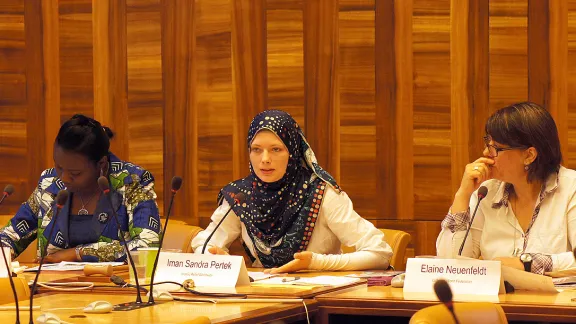
Olga Tshiwewe (WCC), Iman Sandra Pertek (IRW) and Dr Elaine Neuenfeldt (LWF, from left) discuss during the side event on violence against women at the Human Rights Council. Photo: LWF/C.Kästner
“Common vision to protect dignity of girls and women”
(LWI) – Faith-based organizations have issued a joint statement for advancing women’s rights and denouncing gender-based violence at the 29th session of the UN Human Rights Council. In a joint side event, The Lutheran World Federation (LWF) and Islamic Relief Worldwide (IRW) hosted a panel to discuss how faith communities can advocate for women and girls.
“Although we come from different religious traditions, we share a common vision to protect the dignity and rights of women and girls,” the statement reads. It has been signed by The Lutheran World Federation (LWF), The World Council of Churches (WCC), Islamic Relief Worldwide (IRW) and the World YWCA.
“We recognize that religious beliefs can become obstacles, but also resources for addressing gender-based violence,” the statement further says, addressing the issue of “deliberate distortions” and “misinterpretation of religious texts and traditions.”
The statement urges the Human Rights Council to consider faith-based organizations as partners in addressing gender-based violence and advocating for women’s rights, and to create space for interfaith cooperation in the promotion of human rights.
Women turn to religious authorities
During the side event representatives of different organizations discussed the reality of women’s rights and violence against women and girls, as experienced in their daily work.
“The church blessed their union without reservation,” Olga Tshiwewe from the Democratic Republic of Congo and representative of the WCC, recounted the story of a teenage girl forced to quit school and marry a man twice her age. “When her husband started abusing her, she had nowhere to go. Would she turn to that same church for help, which previously had blessed the marriage?”
“They have the same dreams”
“Young women in this region have the same dreams: education, good health and human rights.” Hendrica Okondo, Global program Manager for HIV AIDS with World YWCA, said. “But the culture defines gender norms.”
Malayah Harper, Chief of UN AIDS Gender Equality and Diversity, emphasized the need to work with and through faith communities, and for faith communities to speak up against gender-based violence. “In traditional societies, women are very unlikely to go to formal courts, but they will go to traditional leaders,” she said.
“We need to differentiate culture and religion,” Iman Sandra Pertek, IRW Senior Policy Advisor on Gender, said. “Human rights need to be seen as fundamental rights given by God. Scripture gives us fundamental ground to challenge forced marriage and gender-based violence, and to advocate for the rights of the child.”
Elaine Neuenfeldt, LWF Program Secretary for Women in Church and Society, demanded to also recognize human rights violations in theological language. “As we learnt in the process of discussing the LWF action plan ‘Churches say no to violence against women’ we need to call this violence by its name,” she said. “It is something against God’s will, so theologically speaking it’s a sin.”
Related Links
- Islamic Relief Worldwide Gender Justice Policy
- The Lutheran World Federation Gender Justice Policy
- WCC process
- World YWCA
- Thursday in Black Initiative
- We will speak Out Coalition
- NoXcuse Campaign


